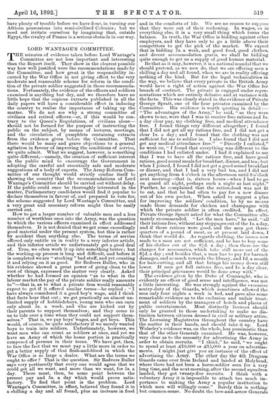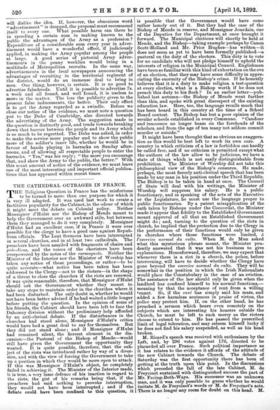LORD WANTAGE'S COMMITTEE. T HE minutes of evidence taken before Lord
Wantage's Committee are not less important and interesting than the Report itself. They show in the clearest possible way how well justified were the recommendations made by the Committee, and how great is the responsibility in- curred by the War Office in not giving effect to the very moderate and reasonable scheme for reform in the condi- tion of the private soldier suggested in those recommenda- tions. Fortunately, the evidence of the officers and soldiers examined is anything but dry, and we therefore have no little hope that the copious extracts published in all the daily papers will have a considerable effect in inducing the country to realise the importance of taking up the matter. We do not see why a strong committee of civilians and retired officers—or, if this would be con- trary to the Queen's Regulations, of civilians alone— should not be formed for the purpose of instructing the public on the subject, by means of lectures, meetings, and the circulation of pamphlets containing extracts from the evidence given before the Committee. That there would be many and grave objections to a general agitation in favour of improving the conditions of service, we quite admit. What we suggest, however, is something quite different,—namely, the creation of sufficient interest in the public mind to encourage the Government in adopting the careful and essentially safe and moderate suggestions of a body of experts. The Army Reform Com- mittee of our thought would strictly confine itself to showing the country that the recommendations of Lord Wantage's Committee should be carried out without delay. If the public could once be thoroughly interested in the matter, Parliamentary candidates would find it popular to declare themselves in favour of, and prepared to vote for, the scheme suggested by Lord Wantage's Committee, and a very great and necessary reform might thus be easily carried out.
How to get a larger number of valuable men and a less number of worthless ones into the Army, was the question to which the various officers examined in effect addressed themselves. It is not denied that we get some exceedingly good material under the present system, but this is rather by accident than anything else. The terms of service offered only entitle us in reality to a very inferior article, and this inferior article we unfortunately get a good deal of. True, we often work it up into something better ; but the working-up process is long and difficult, and before it is completed we are " stocking " bad stuff, and yet counting it and relying on it as good. Sir Redvers Buller, who in his evidence showed a great power of going clean to the root of things, expressed the matter very clearly. Asked whether he had formed an opinion "as to what in the labour market the pay of the private soldier really amounts to "—that is, as to what a private firm would reasonably expect to get if it offered similar terms—he replied : "I have always considered it a good boy's wage, and I think that facts bear that out ; we get practically an almost un- limited supply of hobbledehoys, young men who can earn only about 58. a week, and who are kicked out by their parents to support themselves ; and they come to us to tide over a time when they could not support them- selves." That is, we pay boys' wages, and get boys. This would, of course, be quite satisfactory if we merely wanted boys to train into soldiers. Unfortunately, however, we want men who can count as soldiers at once, and yet we hive an Army of which the home portion is practically composed of persons in their teens. We have got, then, to face the fact that we must pay a little more in order to get a better supply of that flesh-and-blood in which the War Office is so large a dealer. What are the terms we ought to offer ? That is the question. Sir Redvers Buller says very pertinently that every one would agree that we could get all we want, and more than we want, for 5s. a day. There must, then, be some point between the present pay and 5s. a day which would prove satis- factory. To find that point is the problem. Lord Wantage's Committee, in effect, believed they found it in a shilling a day and all found, plus an increase in food and in the comforts of life. We see no reason to suppose that they were out of their reckoning. In wages, as in everything else, it is a very small thing which turns the balance. In truth, the War Office is bidding against other employers, and they have only to go a little above their competitors to get the pick of the market. We expect that in bidding 7s. a week, and good food, good clothes, and decent accommodation gratis, we shall be bidding quite enough to get us a supply of good human material. Be that as it may, however, it is a national scandal that we should pretend, as we now do, that we are offering men a shilling a day and all found, when we are in reality offering nothing of the kind. But for the legal technicalities in the way, we believe that every private in the British Army would have a right of action against the War Office for breach of contract. The private is engaged under repre- sentations which are entirely delusive and at variance with the facts. This was clearly stated in the evidence of Private George Spratt, one of the four privates examined by the Committee. His evidence is worth quoting in detail :— "The advantages of the Army," he said, "as they were shown to me, were that I was to receive free rations and is. a day clear pay, my clothing free, and medical attendance free. I found things very different altogether; I found that I did not get all my rations free, and I did not get a clear is. a day ; and I found that the clothing was not sufficient for me to soldier in. I also found that I did not get any medical attendance free." "Directly I enlisted," he went on, "I found that everything was different to the conditions I had enlisted under. I had it explained to me that I was to have all the rations free, and have good rations, good sound meals for breakfast, dinner, and tea; but when I Joined, I found I did not get a good sound breakfast or dinner, and that I had a very bad tea, and I did not get anything from 4 o'clock in the afternoon until 8 o'clock next morning—that is, sixteen hours—when I had to go on guard all night, perhaps such a night as last night." Further, he complained that the ration-food was not fit to eat, and. that he had often to pay for a new dinner out of his own pocket. When asked to suggest a plan for improving the soldiers' condition, he by no means made those demands for chicken and champagne with which the private soldier is often credited. In effect, Private George Spratt asked for what the Committee ulti- mately recommended. "Let the men have," he said, "all their rations free, without any stoppages out of the Is. a day, and if those rations were good, and the men got three- quarters of a pound of meat, as at present laid down, I think that would do. As regards clothing, the issues now made to a man are not sufficient, and he has to buy some of his clothes out of the 8.1d. a day ; then there are the charges for necessaries, which take still more out of the 81d. a day ; and besides that, a man has to pay for barrack damages, and so much towards the library, and id. a month for hair-cutting, and all that brings his money down still lower. If men got full rations free, and Is. a day clear, their principal grievances would be done away with. ' The evidence given by the Duke of Connaught, who is evidently an officer of good sense and intelligence, was not a little interesting. He was strongly against the excessive sentry-duty of the Guards, which sometimes allowed the men only four nights a week in bed, and gave also some remarkable evidence as to the exclusion and unfair treat- ment of soldiers by the managers of hotels and places of public entertainment. Most distinctly licences should only be granted to those undertaking to make no dis- tinction between citizens dressed in civil or military attire. The Licensing Magistrates throughout the country have the matter in their hands, and should take it up. Lord Wolseley's evidence was, on the whole, less pessimistic than that of the other Generals examined. He was, however, very clear as to the necessity for advertising the Army in order to obtain recruits. "I think," he said, "we ought to spend at least £10,000 or £15,000 a year on advertise- ments. I might just give you an instance of the effect of advertising the Army. The other day the 4th Dragoon Guards came over from Ireland and landed at Holyhead, where there had not been a horse-soldier seen for a very long time, and the next morning, after the second squadron landed, they got twenty-five recruits. I think with a voluntary Army it is impossible to attach too much im- portance to making the Army a popular institution to which men will willingly come." Surely this is nothing but common-sense. No doubt the bow-and-arrow Generals will dislike the idea. If, however, the obnoxious word " advertisement " is dropped, the proposal must recommend itself to every one. What possible harm can there be in spending a certain sum in making known to the public the advantages of the Army as a profession ? Expenditure of a considerable sum every year in adver- tisement would have a wonderful effect, if judiciously applied, in making the Army popular among the people at large. A good series of pictorial Army adver- tisements in the penny weeklies would bring in a multitude of Metropolitan recruits. In the same way, advertisements in the local newspapers announcing the advantages of recruiting in the territorial regiment of the district, would do an immense deal to bring in men. One thing, however, is certain. It is no good to advertise falsehoods. Until it is possible to advertise 7s. a week and all found, and well found, it is useless to move in the matter. The less the publicity given to the present false inducements, the better. Their only effect is to get the Army regarded as a swindle. Before we close our notice of the evidence, we must note a question .put to the Duke of Cambridge, also directed towards the advertising of the Army. The suggestion made in the question is distinctly good, and tends towards breaking down that barrier between the people and its Army which is so much to be regretted. The Duke was asked, in order to make the service more popular and to show the public more of the soldier's inner life, whether he would be in favour of bands playing in barracks on Sunday after- noons, and of allowing all respectable people to enter the barracks. "Yes," was his reply ; "the more you encourage that, and show the Army to the public, the better." With this scant amount of notice of the evidence, we must leave one of the most interesting and important official publica- tions that has appeared within recent times.

































 Previous page
Previous page